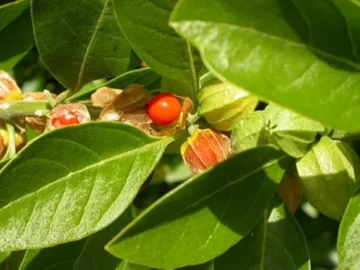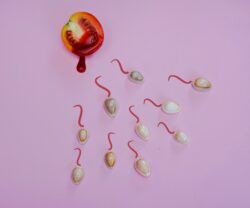Improve Fertility Outcomes with Endometriosis Through Diet & Nutrition
Endometriosis is a chronic medical condition where tissue that normally lines the inside of the uterus, called the endometrium, grows outside the uterus. This tissue can implant itself on various organs within the pelvic cavity, such as the ovaries, fallopian tubes, the outer surface of the uterus, and the lining of the pelvis.
This often-painful condition is also a leading cause of infertility in women.
Making dietary changes may help to reduce symptoms and optimize fertility with endometriosis. Since endometriosis is an inflammatory disorder, it is advisable to incorporate anti-inflammatory foods into the diet that can also impact estrogen levels. In this post, we will go through how to improve fertility Outcomes with endometriosis through diet and nutrition

The Link Between Endometriosis and Fertility:
According to research between 30% and 50% of women with endometriosis are infertile. The relationship between endometriosis and infertility is well-established in the literature. However, the exact cause-effect relationship is still debated. The primary causes are related to both egg health and anatomical changes including (but not limited to) scarring, damage and/or blockage of the fallopian tubes and ovaries. The scarring/blockage caused by the endometrial cells may interfere with ovulation and/or can prevent the journey of an egg along the fallopian tube and/or the sperm from reaching the egg.
Laparoscopic surgery can be performed to remove endometriotic patches, adhesions, implants, cysts and nodules to improve fertility or reduce symptoms. If this procedure does not succeed, it may be necessary to consider IVF treatments.

Improve Fertility Outcomes Through Pro & Anti Inflammatory Foods:
Saturated & Trans Fat:
Consuming trans fats and refined oils can trigger an inflammatory response in the body. Palmitic acid (a saturated fat found in palm oil, palm kernel oil, coconut oil, butter, and red meats)has been linked to increased rates of endometriosis.
Women who consumed foods containing hydrogenated vegetable fat the most (margarine, bread and cookies, snack foods, fried foods, processed products) were 48% more likely to develop the disease than those who consumed less.
Omega- 3 & Omega-6 Fat
Omega-6 is a major pro-inflammatory factor in the body, while omega-3 fatty acids have been shown to have an anti-inflammatory effect. Even short-term dietary changes incorporating omega-3 fatty acids can help reduce the effects of endometriosis. Women who consume more long-chain omega-3 fatty acids are 22% less likely to be diagnosed with endometriosis than those who consume less. Furthermore, reducing saturated fat by 50% has been found to lower estrogen levels by 20%.
Focus on Antioxidants
Women with endometriosis have elevated levels of free radicals in their bodies. Free radicals increase ‘oxidative stress’. You can think of oxidative stress as “wrecking balls” causing damage to the cells in the body. This damage can affect your cells, your DNA, and important parts of your body like your heart, brain, and skin. Antioxidants are like the repair crew who bind with free radicals to create more stable molecules and reduce their harmful effects. This reduces the amount of oxidative stress and therefore reduces inflammation in those with endometriosis.
A study investigated the impact of antioxidant supplementation (vitamins E and C) on endometriosis pain. It was discovered that 43% of those who consumed more antioxidants experienced less pain compared to 0% in the control group. Individuals taking the antioxidant supplement had significantly lower levels of three inflammatory markers compared to those not taking the supplement. Therefore, it is concluded that increasing antioxidant intake in women with endometriosis has a positive effect on their condition.

The Link Between Fiber & Estrogen
Excess estrogen in the body can worsen the effects of endometriosis by promoting inflammation. Too much estrogen stimulates the formation of lipid substances ( called prostaglandins) which act like hormones. Prostaglandins increase inflammation and heighten the pain in the pelvic regions of those with endometriosis. Along with this, estrogen has been found to increase endometriosis cell growth and numbers, meaning larger cells and more. There are many benefits of fiber, including its link to estrogen. Fiber can help excrete estrogen out of the body through a process known as ‘barrier protection’. During this process fiber surrounds estrogen substances and takes them on a journey outside the body before they can be absorbed. However, not all fibers are created equally. Consuming high glycemic index (GI) fibers can elevate insulin levels, which in turn can increase estrogen concentration and potentially contribute to the growth of endometriosis cells.
Some examples of high GI fibers include:
- Bread
- Cereal
- Bananas
- Granola
- Quinoa
- Corn chips
- Rice
- Milk
- Strawberries
- Carrots
- Nuts
- Broccoli
- Leafy Greens
- Celery
- Cucumber
- Yogurt

Fruit & Vegetable Impact
Most research shows a strong inverse relationship between endometriosis and fruit and vegetable consumption because of their combined factors. A study by Britton and colleagues in 2003 found that women who had a high intake of fruit and vegetables were less likely to have endometriosis. Brassica aka cruciferous vegetables in particular have been found to reduce estrogen levels.
Examples of brassica vegetables include:
- broccoli
- cauliflower
- cabbage
- brussel sprouts
- kale
- bok choy
- radishes
- turnips
- collard greens
It’s important to note that consuming fruits and vegetables contaminated with pesticides and dioxins can lead to endometriosis and its symptoms. This may be due to certain pesticides interfering with hormonal pathways and contributing to oxidative stress. It has been found that consuming particular fruit can worsen endometriosis symptoms in women due to high levels of pesticide residue and dioxins.
Bottom Line
Specific dietary choices can potentially increase fertility outcomes in those with endometriosis. The following list outlines the information explained above:
- Decrease saturated, trans and refined fat intake such as butter, coconut oil, red meats, cookies and pastries.
- Increase omega-3 intake through fatty fish like salmon and tuna
- Increase antioxidant intakes such as vitamin C and vitamin E
- Increase low GI Fiber intake
- Increase Fruit and Vegetable Intake
If you were diagnosed with endometriosis and are interested in optimizing your fertility, Radically Rooted offers customized meal plans just for you!
Reach out to us or Book a consultation with one of our expert-certified dietitians & nutritionists for individualized nutrition & supplementation advice!




